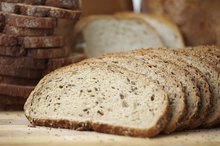What does fact checked mean?
At Healthfully, we strive to deliver objective content that is accurate and up-to-date. Our team periodically reviews articles in order to ensure content quality. The sources cited below consist of evidence from peer-reviewed journals, prominent medical organizations, academic associations, and government data.
The information contained on this site is for informational purposes only, and should not be used as a substitute for the advice of a professional health care provider. Please check with the appropriate physician regarding health questions and concerns. Although we strive to deliver accurate and up-to-date information, no guarantee to that effect is made.
Duathlon Training & Diet
If you want to succeed as a duathlete, you need to put as much thought into your diet as you do your training 1. Training for the duathlon involves running and biking on alternating days most days of the week 1. To improve endurance, strength, speed and recovery while training and get in prime condition for your race, make sure your diet is adequate in calories, carbs, fat and protein and filled with nutrient-rich foods.
You Need Your Calories
Training for a duathlon is grueling, so it's important to stay energized and make sure you get enough calories. Calorie needs may vary from day to day depending on how many miles you're running or biking. In general, male duathletes need 20 calories per pound of body weight and female duathletes need 17 calories per pound of body weight to maintain their weight. For example, a male duathlete who weighs 150 pounds needs 3,000 calories a day.
- Training for a duathlon is grueling, so it's important to stay energized and make sure you get enough calories.
Fuel Up With Carbs
A Male Gymnast's Diet
Learn More
Carbs digest easily and are used quickly, making them the preferred source of fuel for the duathlete. Getting enough carbs while training for your race keeps you energized and may help prevent injury. Depending on the intensity of your training, you need 3 grams to 5 grams of carbs per pound of body weight, or 450 grams to 750 grams for the 150-pound male duathlete. Healthy carbs to include in your training diet include grains, fruit, low-fat milk or yogurt and starchy vegetables such as potatoes.
- Carbs digest easily and are used quickly, making them the preferred source of fuel for the duathlete.
- Getting enough carbs while training for your race keeps you energized and may help prevent injury.
Protein and Fat
Protein and fat are also important nutrients for your training. Protein assists with muscle building and recovery, and fat also provides energy. Aim for 0.5 gram to 1 gram of protein per pound of body weight, and 0.5 gram of fat per pound of body weight. The 150-pound male duathlete needs 75 to 150 grams of protein a day and 75 grams of fat. Get your protein from healthy sources such as:
- salmon
- nuts
- seeds
- oils
- avocados
- Protein and fat are also important nutrients for your training.
- The 150-pound male duathlete needs 75 to 150 grams of protein a day and 75 grams of fat.
Training Meal Plan
The Perfect Distance Runner's Diet
Learn More
Due to your high calorie needs and rigorous training schedule, you may be better off eating six to eight small meals throughout the day rather than the traditional three. Eat two hours before training and within 30 minutes of finishing to maximize your workout and aid in recovery. A healthy pre-workout meal should be easy to digest, such as yogurt with fruit or a bagel with peanut butter. After your workout, go for a snack high in carbs with some protein, such as half a turkey sandwich.
- Due to your high calorie needs and rigorous training schedule, you may be better off eating six to eight small meals throughout the day rather than the traditional three.
- After your workout, go for a snack high in carbs with some protein, such as half a turkey sandwich.
Related Articles
References
Writer Bio
Jill Corleone is a registered dietitian and health coach who has been writing and lecturing on diet and health for more than 15 years. Her work has been featured on the Huffington Post, Diabetes Self-Management and in the book "Noninvasive Mechanical Ventilation," edited by John R. Bach, M.D. Corleone holds a Bachelor of Science in nutrition.









